Explore Busan - South Korea Travel, Asia
Busan, South Korea's second-largest city, is located on the southeastern coast, facing the Korea Strait. Known for its strategic position as a major maritime hub, Busan is surrounded by mountains to the north and the sea to the south, offering a stunning mix of natural landscapes. Home to over 3.3 million residents, the city has a rich history dating back to the Neolithic era and played a significant role during the Korean War as a refuge and military base.
Population: approximately 3.4 million as of 2024.
Economy: Busan is a major industrial and commercial center, with a focus on shipping, manufacturing, and tourism.
The city is home to the Busan Port, one of the busiest container ports in the world.
Landmarks: Haeundae Beach, Gamcheon Culture Village, Busan Tower, Jagalchi Fish Market, Nurimaru APEC House.
South Korea
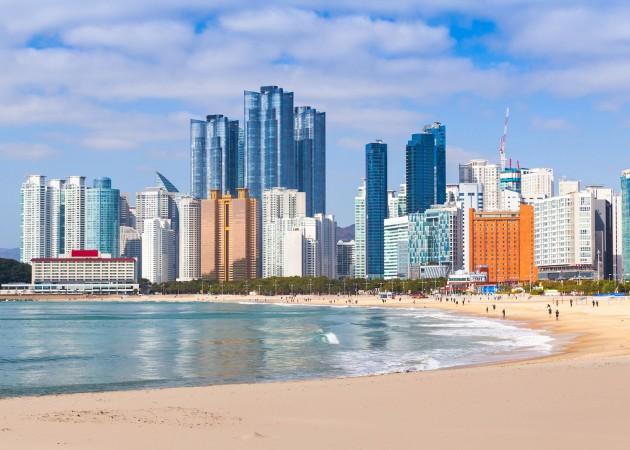
Overview of Busan
History & Culture Influence
The history of Busan dates back to prehistoric times, with archaeological evidence indicating human settlement in the area as early as the Paleolithic period. However, it was during the Gaya confederacy (approximately 532-562 AD) that Busan began to emerge as a significant settlement. The Gaya Kingdom was known for its iron production, and Busan's strategic location along trade routes facilitated its growth as a commercial hub.
During the Unified Silla period (668-935 AD), Busan became a vital port, establishing itself as a key point for maritime trade with Japan and China. The city’s historical significance continued to flourish during the Joseon Dynasty (1392-1910), when it served as a gateway for diplomatic relations with Japan. The establishment of the Waegwan, a residential and commercial area for Japanese traders, marked Busan as a critical center for international trade.
Interaction with The Locals
Busan people are generally known for their hospitality and friendliness towards tourists. The local culture places a strong emphasis on respect and politeness, which is evident in the interactions between residents and visitors. Many locals are eager to help tourists navigate the city, whether it’s providing directions to attractions or recommending local eateries.
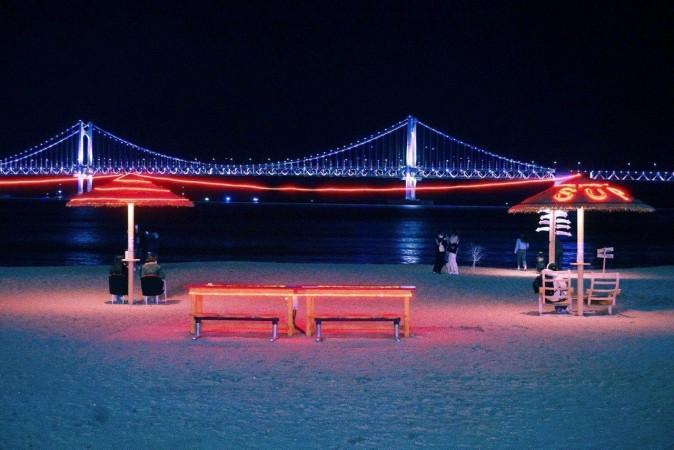
Gwangalli Beach - © koreabyme
Top Attractions in Busan
Busan, South Korea's vibrant port city, is rich in attractions that showcase its natural beauty, historical significance, and cultural depth. Whether you're lounging on the beaches, exploring bustling markets, or taking in breathtaking views, Busan has something for everyone to enjoy:
Gamcheon Culture Village
Location: 203 Gamnae 2-ro, Saha-gu, Busan
Gamcheon Culture Village is a colorful and artistic neighborhood often referred to as the "Machu Picchu of Busan." Originally a hillside slum, it has been transformed into a cultural hub filled with brightly painted houses, artistic murals, and quaint alleyways. Visitors can explore small galleries, cafes, and shops while enjoying panoramic views of the city. The village is a testament to community spirit and creativity, making it a must-visit for those interested in local art and culture.
Haeundae Beach
Location: Haeundae-gu, Busan
Haeundae Beach is perhaps the most famous beach in South Korea, known for its stunning coastline that stretches over 1.5 kilometers. The beach is a bustling hub of activity, especially during the summer months, hosting various festivals and events. Visitors can relax on the sandy shores, enjoy water sports, or explore the vibrant promenade lined with restaurants and cafes. Haeundae Beach is ideal for sunbathing, swimming, and soaking in the lively atmosphere.
Beomeosa Temple
Location: 250 Beomeosa-ro, Geumjeong-gu, Busan
Nestled on the slopes of Geumjeongsan Mountain, Beomeosa Temple is a historic Buddhist temple dating back to 678 AD. This serene site offers a peaceful retreat from the city's hustle and bustle, with beautiful architecture and tranquil surroundings. Visitors can explore the temple grounds, participate in meditation sessions, or join the temple stay program to experience the life of a monk. Beomeosa is a significant cultural and spiritual site, providing insight into Korea's Buddhist heritage.
Gwangalli Beach
Location: Gwangalli-dong, Suyeong-gu, Busan
Gwangalli Beach is renowned for its stunning views of the Gwangan Bridge, especially when illuminated at night. The beach is a popular spot for both locals and tourists, offering a lively atmosphere with numerous cafes, bars, and restaurants along the waterfront. It’s an excellent place for evening strolls, beachside dining, and enjoying live music performances. Gwangalli Beach is also known for hosting events like the Busan Fireworks Festival, making it a vibrant destination year-round.
Busan Tower
Location: 37 Yongdusan-gil, Jung-gu, Busan
Located in Yongdusan Park, Busan Tower stands at 120 meters and offers panoramic views of the city and harbor. Visitors can take an elevator to the observation deck, where they can enjoy breathtaking vistas, especially at sunset. The park surrounding the tower is also home to beautiful gardens, sculptures, and cultural landmarks, making it a great spot for a leisurely stroll. The tower is a symbol of Busan and a popular destination for both tourists and locals.
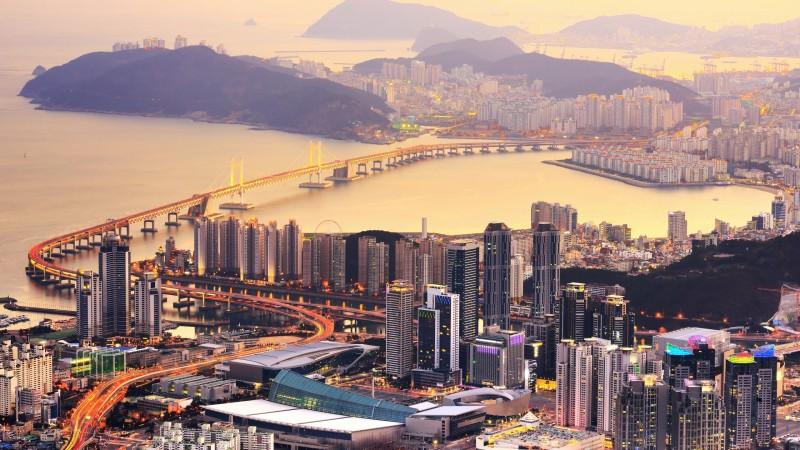
Busan city skyline - © iStock (@SeanPavonePhoto)
What to Do in Busan
Busan, South Korea's vibrant coastal city, offers a diverse range of activities that cater to both outdoor enthusiasts and culture seekers, there’s something for everyone to enjoy. Each activity provides a unique glimpse into the heart of this dynamic city, ensuring that your visit to Busan is both memorable and fulfilling.
- Hiking at Geumjeongsan Mountain: Embark on a hiking adventure at Geumjeongsan Mountain, one of Busan's most popular natural attractions. The trails here lead through lush forests and offer stunning panoramic views of the city and coastline. Along the way, you can explore the historic Beomeosa Temple, a serene Buddhist temple nestled in the mountains. The combination of physical activity and spiritual exploration makes this hike both invigorating and enriching.
- Surfing at Haeundae Beach: Haeundae Beach is not only famous for its golden sands and vibrant atmosphere but also for its surf culture. Whether you are a seasoned surfer or a beginner, this beach offers surf lessons and rental equipment. The waves here provide an exciting challenge, and after a day on the water, you can relax at one of the many beachfront cafes, enjoying the sunset over the ocean.
- Exploring Gamcheon Culture Village: Step into the colorful world of Gamcheon Culture Village, often referred to as the "Machu Picchu of Busan." This artistic neighborhood is characterized by its brightly painted houses, creative murals, and narrow alleyways. Visitors can wander through the village, discovering local art galleries, craft shops, and cafes. The area is also known for its community projects that promote art and culture, making it a perfect spot for those interested in local creativity and heritage.
- Paragliding Over Gwangalli Beach: For thrill-seekers, paragliding over Gwangalli Beach offers an exhilarating experience. Soar above the coastline and enjoy breathtaking views of the ocean, Gwangan Bridge, and the cityscape below. This adventure provides a unique perspective of Busan, combining the thrill of flight with the beauty of nature. It’s an unforgettable way to experience the city from above.
- Visiting Jagalchi Fish Market: No trip to Busan is complete without a visit to Jagalchi Fish Market, Korea's largest seafood market. Here, you can immerse yourself in the local culture, witnessing the bustling atmosphere as vendors sell fresh fish and seafood. Sample delicacies like live octopus or grilled fish at one of the market's many food stalls. This experience not only tantalizes your taste buds but also offers insight into Busan's maritime heritage and culinary traditions.
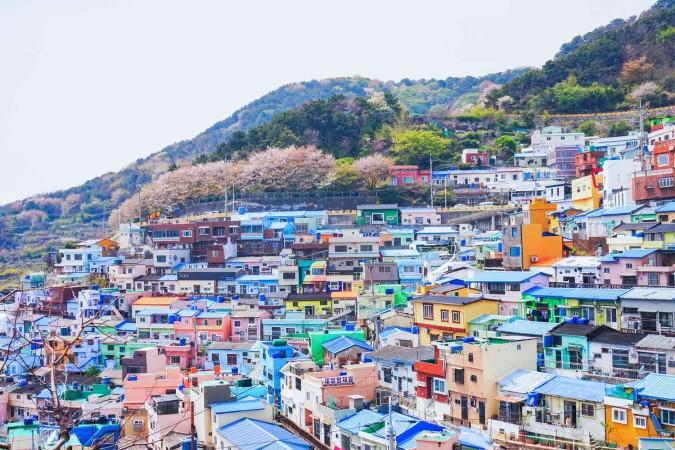
Gamcheon Culture Village - © Laodong
Weather in Busan: Best Time to Visit
Temperatures
- Busan has a humid subtropical climate with four distinct seasons.
- Average high temperatures range from 7°C (45°F) in January to 29°C (84°F) in August.
- Average low temperatures range from -1°C (30°F) in January to 23°C (73°F) in August.
- Spring (March-May) and fall (September-November) are mild, with average highs around 15-20°C (59-68°F).
Rainfall
- Busan experiences a monsoon season from June to August, with the highest rainfall in July.
- July is the wettest month, with an average of 383mm (15 inches) of rain.
- The driest months are January and December, with around 40mm (1.6 inches) of rain.
- Typhoons can bring heavy rain and strong winds, typically from July to October.
Other Weather Patterns
- Busan has a relatively high humidity year-round, averaging 60-70%.
- Winters can be chilly and dry, with occasional light snowfall.
- Spring and fall are generally sunny, with occasional rain showers.
- Summers are hot, humid and sunny, with frequent afternoon thunderstorms.
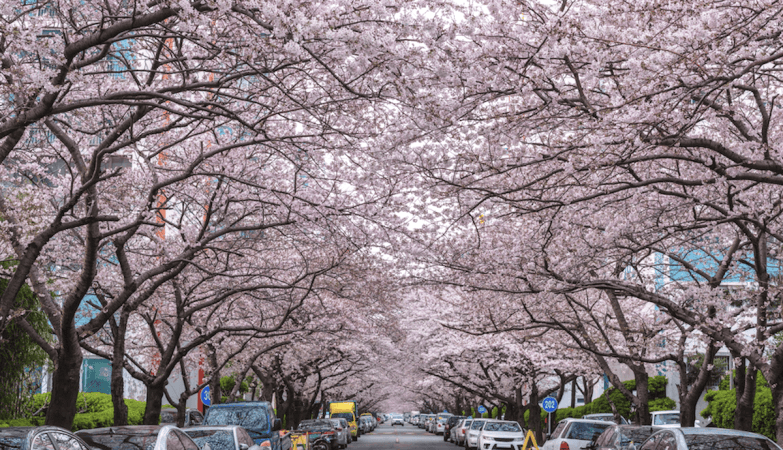
Busan cherry blossom festival - © Hey Roseanne
Cultural Etiquette in Busan
Greetings and Introductions
- Greet people with a slight bow, the deeper the bow the more respect shown.
- Use both hands or your right hand supported by your left when shaking hands.
- Expect personal questions, as this is seen as polite interest in your life.
Dining Etiquette
- Wait to be seated, with elders and those of higher status seated first.
- Elders are served first and begin eating first, everyone waits for them.
- Avoid pointing chopsticks at others or standing them upright in rice.
- Pour drinks for others before yourself, using both hands.
Gift Giving
- Gifts are given and received with a slight bow.
- Avoid giving white flowers, as they are associated with funerals.
Manners and Customs
- Remove shoes when entering a home or some traditional restaurants.
- Avoid excessive body contact, as Koreans value personal space.
- Punctuality is highly respected, so try to be on time.
- Modesty and humility are admired traits in Korean culture.
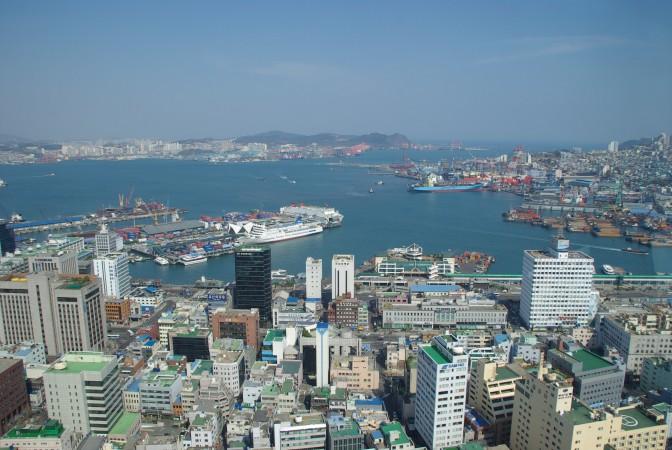
Busan city scape - © Wikimedia
Festivals & Local Celebrations
Busan International Film Festival (BIFF)
Every October, Busan comes alive with cinematic flair as it hosts the Busan International Film Festival (BIFF), Asia's largest and most prestigious film festival. Running from October 2-11 in 2024, the festival takes place primarily in Centum City and the bustling BIFF Square. Visitors can look forward to screenings of international films that span genres and cultures, making it a haven for movie lovers. The excitement doesn’t stop there—BIFF also features glamorous red carpet events, where fans can catch a glimpse of their favorite actors and filmmakers. Beyond the screenings, the festival offers film industry forums, workshops, and networking opportunities, drawing professionals from all over the world. Whether you're an aspiring filmmaker or a cinema enthusiast, BIFF promises an unforgettable experience.
Busan Fireworks Festival
One of Busan's most breathtaking autumn events is the Busan Fireworks Festival, which takes place annually in November at Gwangalli Beach. In 2024, the event is set for November 9, and it's a night not to be missed. Spectacular fireworks light up the sky over the ocean, choreographed to music and accompanied by stunning light shows. It's an event that draws thousands of spectators, and for good reason—the scale and beauty of the displays are nothing short of awe-inspiring. In addition to the fireworks, the festival features food stalls, cultural performances, and fun activities for all ages. While Gwangalli Beach is the prime viewing spot, you can also catch the show from other scenic locations like Dongbaekseom Island or Igidae Coastal Park.
Haeundae Sand Festival
In late May, Busan’s famous Haeundae Beach transforms into a canvas of creativity during the Haeundae Sand Festival. From May 24-27 in 2024, visitors can marvel at magnificent sand sculptures crafted by world-renowned artists, showcasing everything from mythical creatures to architectural masterpieces. But the fun doesn't stop at just looking—attendees can also participate in interactive sand art activities, making it a perfect family-friendly outing. The beach buzzes with energy as performances and concerts take place throughout the festival. Even after the main event, the sand sculptures remain on display until June 9, giving visitors plenty of time to enjoy this unique summer spectacle.
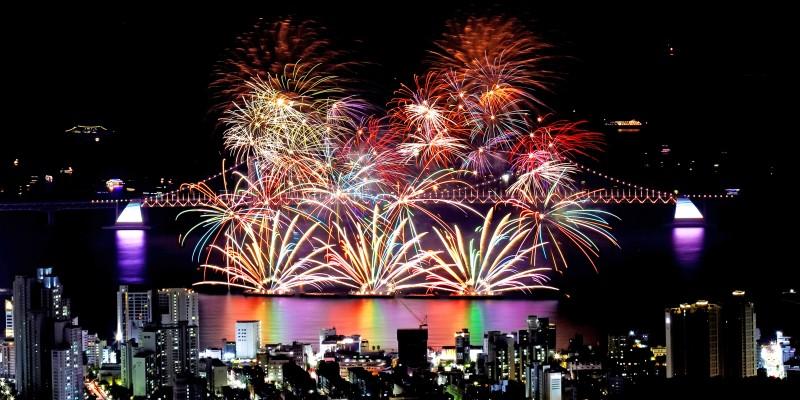
Busan Fireworks Festival - © Busan Metropolitan city
Shopping in Busan
- Nampodong Underground Shopping Center: Nampodong is known as Busan's main shopping district, with the underground shopping center being a popular spot for bargain hunting. You can find a wide variety of goods here, from clothing and accessories to electronics and souvenirs. It's a great place to pick up inexpensive Korean fashion and unique local crafts.
- Gukje Market: Gukje Market is one of the largest traditional markets in Busan. Originally established by war refugees in the 1950s, it now offers an eclectic mix of goods, from antiques and vintage items to clothing, accessories, and local specialties. Look for traditional Korean fans, hanji (Korean paper) products, and Busan-made souvenirs.
- Jagalchi Market: Jagalchi Market is famous for its fresh seafood, but it also has a section selling local handicrafts and souvenirs. You can find things like traditional Korean knives, pottery, and dried fish snacks. The market has a lively atmosphere and is a great place to soak up Busan's maritime culture.
- Busan Gamcheon Culture Village: This colorful, artistic neighborhood is a popular spot for unique souvenirs. Wander through the maze of alleys lined with galleries, craft shops, and cafes. Look for handmade crafts, paintings, and quirky souvenirs that capture the village's vibrant spirit.
- Shinsegae Department Store: As one of the largest department stores in Busan, Shinsegae has a great selection of Korean fashion, beauty products, and souvenirs. Check out the basement food hall for gourmet Korean snacks and ingredients to bring home. The store also has a large duty-free section.
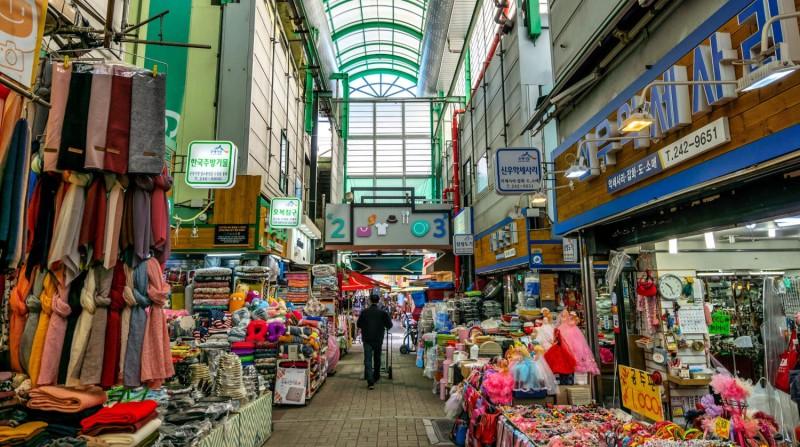
Gukje Market - © Shutterstock (@aaron choi)
Essential Travel Information
Getting Around Busan
- Subway: The Busan Metro consists of four lines that connect major districts and attractions. The subway is efficient, clean, and offers English signage, making it accessible for international visitors. Key stops include Haeundae Beach, Jagalchi Fish Market, and Nampo-dong.
- Buses: The city’s bus network is comprehensive, with routes covering almost every corner of Busan. Buses are color-coded: blue buses serve long-distance routes, green buses operate within districts, and red buses are express services. The bus fare is affordable, and transfers between buses and subways are seamless.
- Taxis: Taxis are a convenient option for getting around Busan, especially for short distances or when traveling with luggage. They are easily hailed on the street or booked via apps. The taxi rates are reasonable, and drivers are generally helpful, although it’s advisable to have your destination written in Korean to avoid any confusion.
- Ride-Sharing: Ride-sharing services like KakaoTaxi and Tada are also available in Busan. These platforms allow users to book rides through their smartphones, offering an alternative to traditional taxis. They often provide competitive pricing and the convenience of cashless transactions.
ATM and Banking Services in Busan
When traveling to Busan, you’ll find that accessing cash and banking services is incredibly convenient, thanks to the wide availability of ATMs throughout the city. You’ll easily spot them at banks, train stations, supermarkets, and even convenience stores, ensuring that you’re never far from one when needed. Several major banks offer international ATM services, including Kookmin Bank (KB), Woori Bank, Shinhan Bank, and KEB Hana Bank. These bank-operated ATMs generally have lower fees and higher withdrawal limits than non-bank ATMs, making them a great option for international travelers looking to avoid extra charges.
- Using Foreign Cards: If you’re using a foreign card, be on the lookout for ATMs marked as "global" or displaying international network logos such as Visa, Mastercard, or Cirrus. Banks like Woori Bank and KB Bank are particularly well-regarded for their reliability when it comes to processing foreign cards. Most of these ATMs provide English language options, making the process user-friendly even if you’re not familiar with Korean.
- Fees and Tips: When withdrawing cash from an ATM, expect to pay a fee of around 3,500-4,800 KRW (approximately $3-4 USD) for international transactions at bank-operated ATMs. Non-bank ATMs, such as those found in convenience stores, may charge higher fees, so it’s worth seeking out a bank ATM if possible. Additionally, your home bank might apply extra fees for international withdrawals and currency conversions, so it’s a good idea to withdraw larger amounts less frequently to reduce the overall cost of transactions.
- Currency Exchange: Prefer to exchange currency instead of using ATMs? No problem. Most major banks in Busan offer currency exchange services on weekdays. One convenient location is the Korean Exchange Bank in Jung-gu, located downtown. If you're arriving by plane or train, you’ll also find currency exchange bureaus at the airport, train station, and in key shopping areas, making it easy to exchange money at your convenience.
Where to Stay in Busan
When it comes to finding a place to stay in Busan, you’ll have no shortage of options, whether you're looking for luxury, mid-range comfort, or budget-friendly accommodations.
- Luxury Hotels: If you’re after a high-end experience, the Lotte Hotel Busan is a top choice. With 650 individually furnished rooms and 24-hour room service, it also offers convenient on-site ATM and banking services.
- Mid-Range Hotels: The ASTI Hotel Busan Station, a newer 4-star hotel that opened in 2018, is situated right in the heart of the city, making it a great base for exploring. Similarly, Connect Busan Hotel provides comfortable rooms and easy access to popular attractions.
- Budget-Friendly Options: For those traveling on a budget, the Busan View Hotel Busan Station is an excellent choice, offering affordable rates starting as low as $23 per night, without sacrificing comfort.
Articles for you
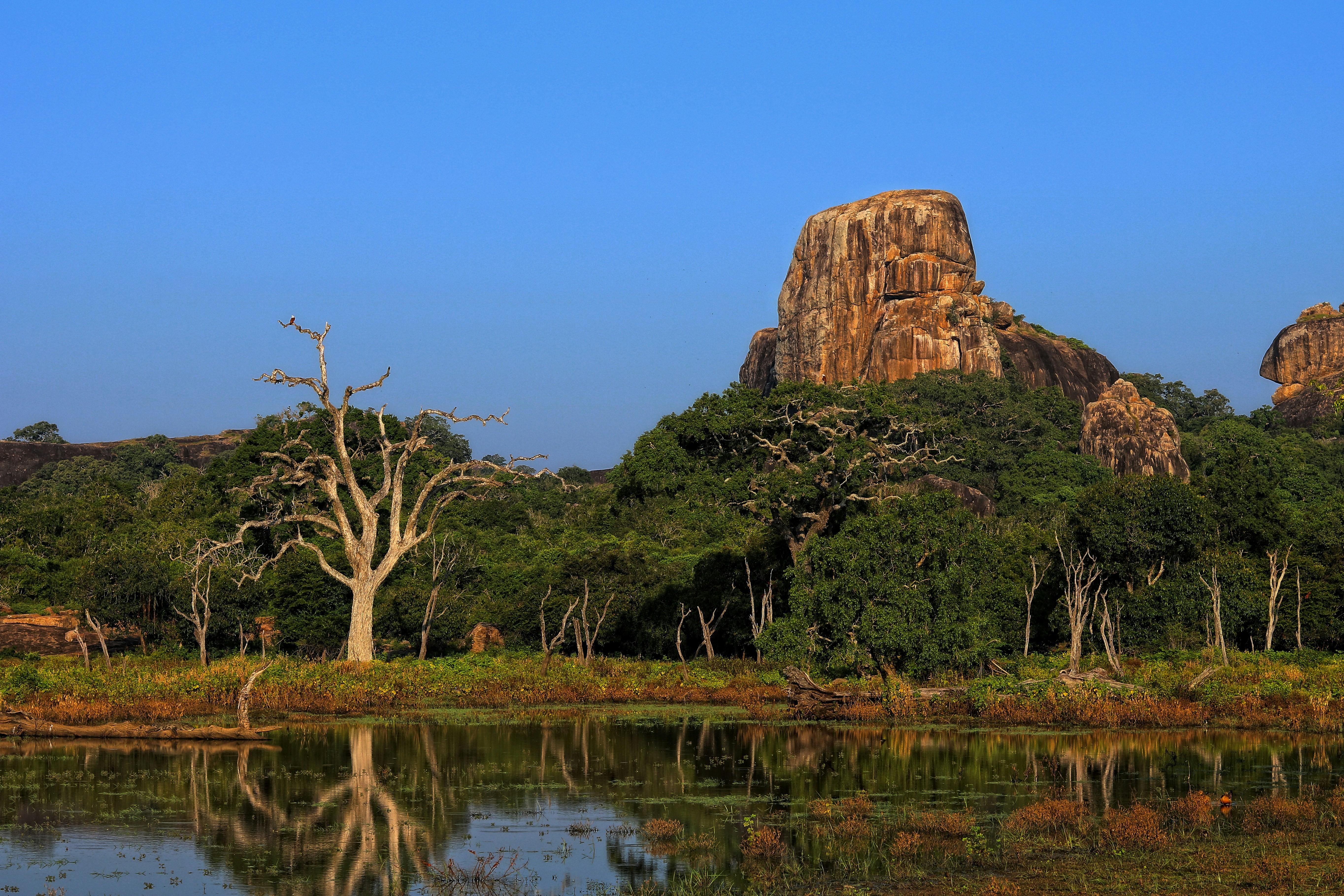
Explore Yala National Park - Sri Lanka Travel, Asia
Tucked away in Sri Lanka’s southeastern corner, Yala National Park is where wild nature meets deep tradition. Known worldwide for its leopard population, the park is also home to elephants, sloth bears, crocodiles, and hundreds of bird species. Beyond wildlife, Yala opens doors to a cultural landscape dotted with ancient temples, Buddhist ruins, and coastal villages. For travelers seeking more than just a safari, Yala offers a chance to explore eco-tourism, local communities, and sacred heritage sites.
Population: The Yala National Park area doesn’t have a human population.
Economy: The economy around Yala National Park thrives on a blend of eco-tourism, agriculture, and local services. Safari tours, eco-lodges, and cultural experiences drive steady income for nearby towns like Tissamaharama and Kataragama, supporting thousands of families.
Landmarks: Famous for Block I of Yala and wildlife encounters, including elephants, sloth bears, crocodiles, and exotic bird species.
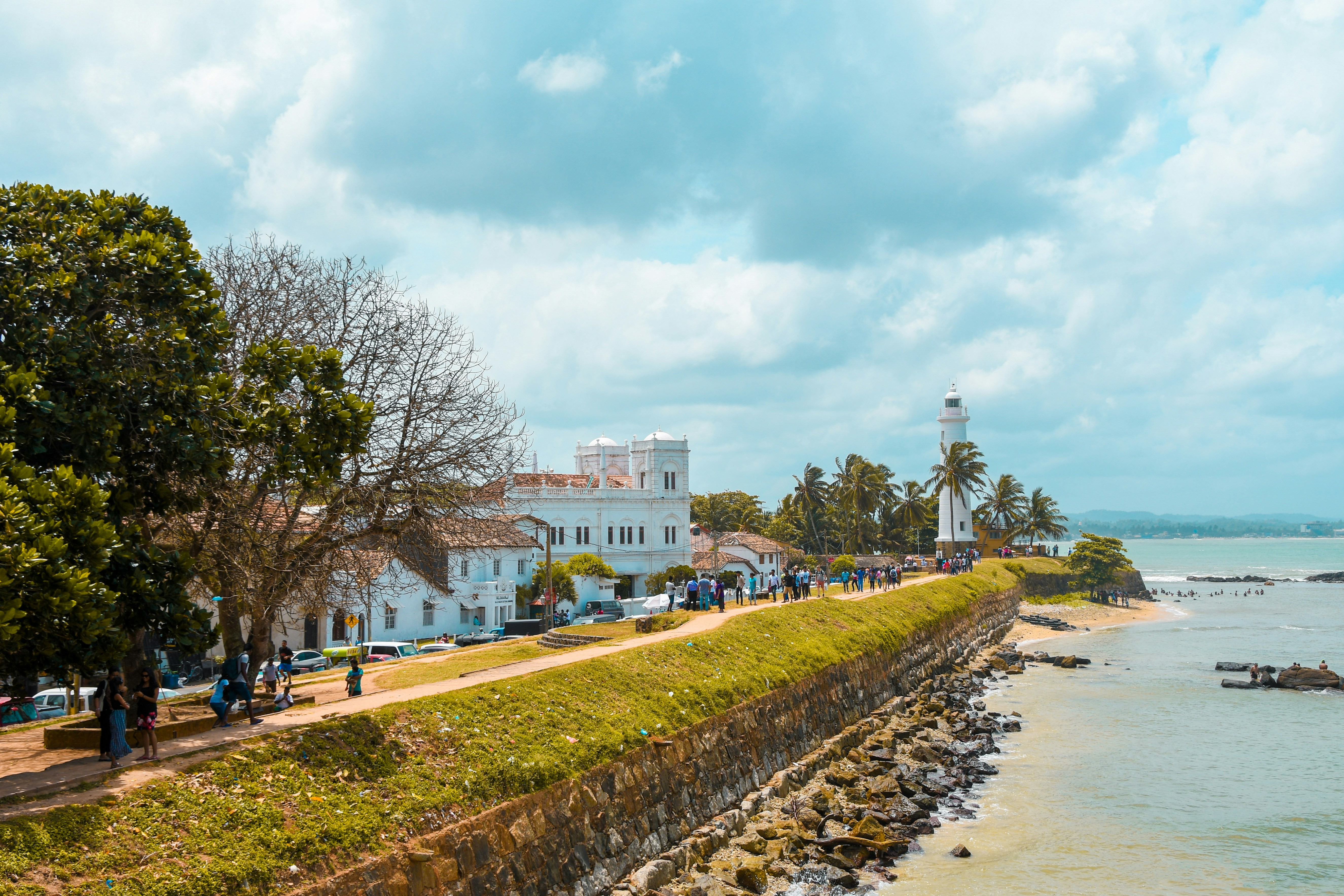
Explore Galle - Sri Lanka Travel, Asia
Nestled on Sri Lanka’s southern coastline, Galle is a vibrant city where history meets the sea. Its cobbled streets, colonial architecture, and serene beaches make it a must-visit destination for travelers seeking a blend of culture, adventure, and relaxation. A UNESCO World Heritage site, Galle captivates visitors with its Dutch Fort, bustling markets, and friendly locals. Whether you’re exploring the ramparts at sunset or savoring fresh seafood by the shore, Galle promises an unforgettable journey into Sri Lanka’s heritage.
Population: Approximately 113,000 in 2023.
Economy: Galle’s economy thrives on tourism, trade, and fisheries. The city’s historic fort, colonial architecture, and coastal charm draw thousands of international visitors each year, making tourism its main economic driver. Fishing remains vital for local livelihoods, supplying fresh seafood across the region.
Landmarks: Famous for the Galle Fort, Dutch Reformed Church & Maritime Museum, and Unawatuna Beach.
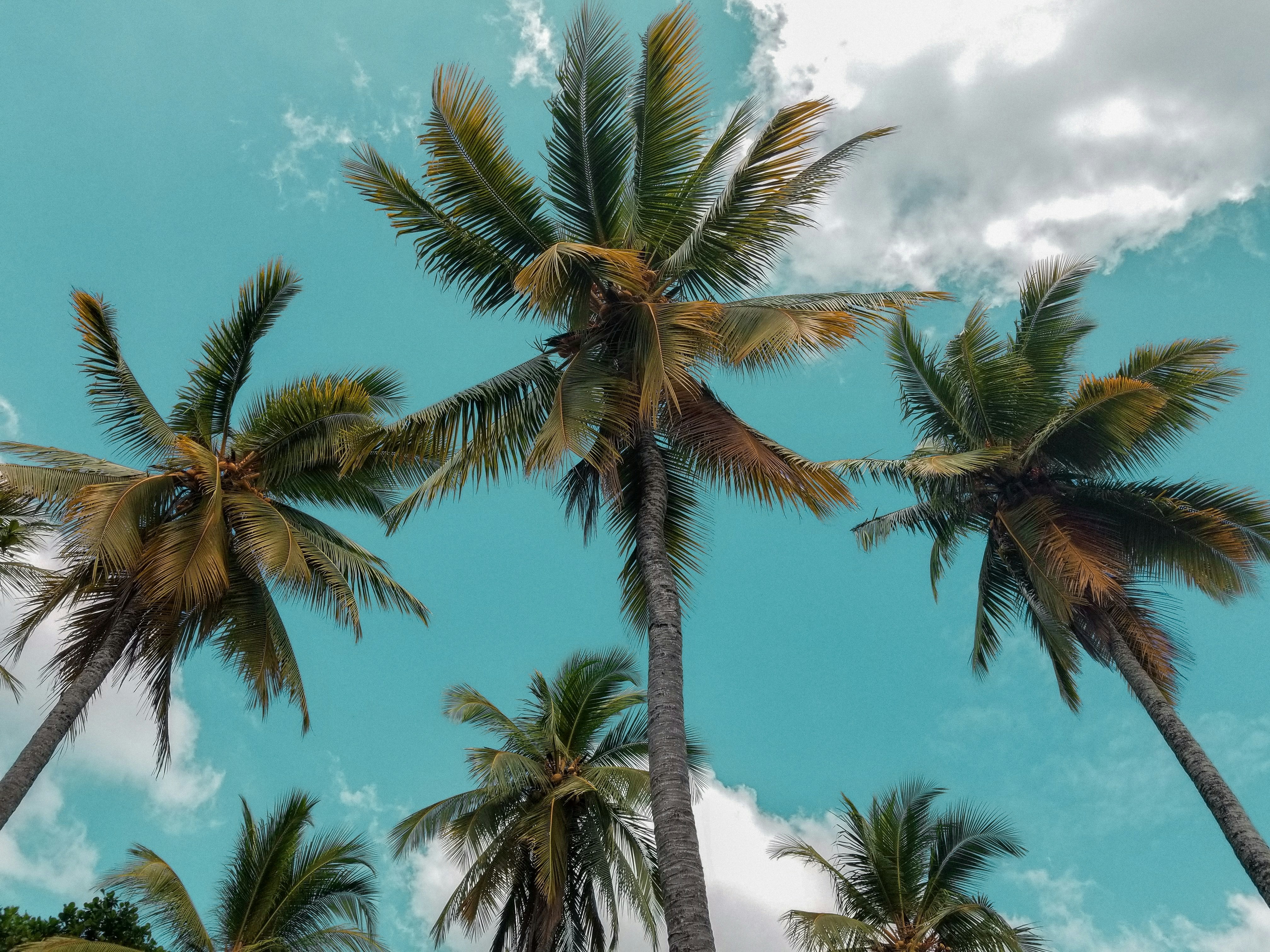
Explore Bentota - Sri Lanka Travel, Asia
Nestled along Sri Lanka’s southwestern coast, Bentota is a tropical paradise that blends golden beaches, vibrant culture, and thrilling adventures. Famous for its calm waters, luxury resorts, and scenic river estuary, Bentota has become a top destination for travelers seeking both relaxation and authentic experiences. From serene beach walks at sunrise to adrenaline-pumping water sports, this coastal town offers a perfect balance of leisure and exploration. With its proximity to Colombo and Galle, Bentota is easy to reach, making it an ideal stop for both short escapes and extended holidays.
Population: Approximately 37,000 in 2023.
Economy: Bentota’s economy thrives mainly on tourism, which drives local businesses such as hotels, restaurants, and wellness retreats. The town also benefits from fishing, coconut cultivation, and handicrafts like wood carving and batik textiles. Many residents rely on the growing demand for water sports and Ayurvedic treatments, making tourism the backbone of both income and employment in the area.
Landmarks: Famous for Bentota Beach, Bentota River Safari, and Kande Vihara Temple.
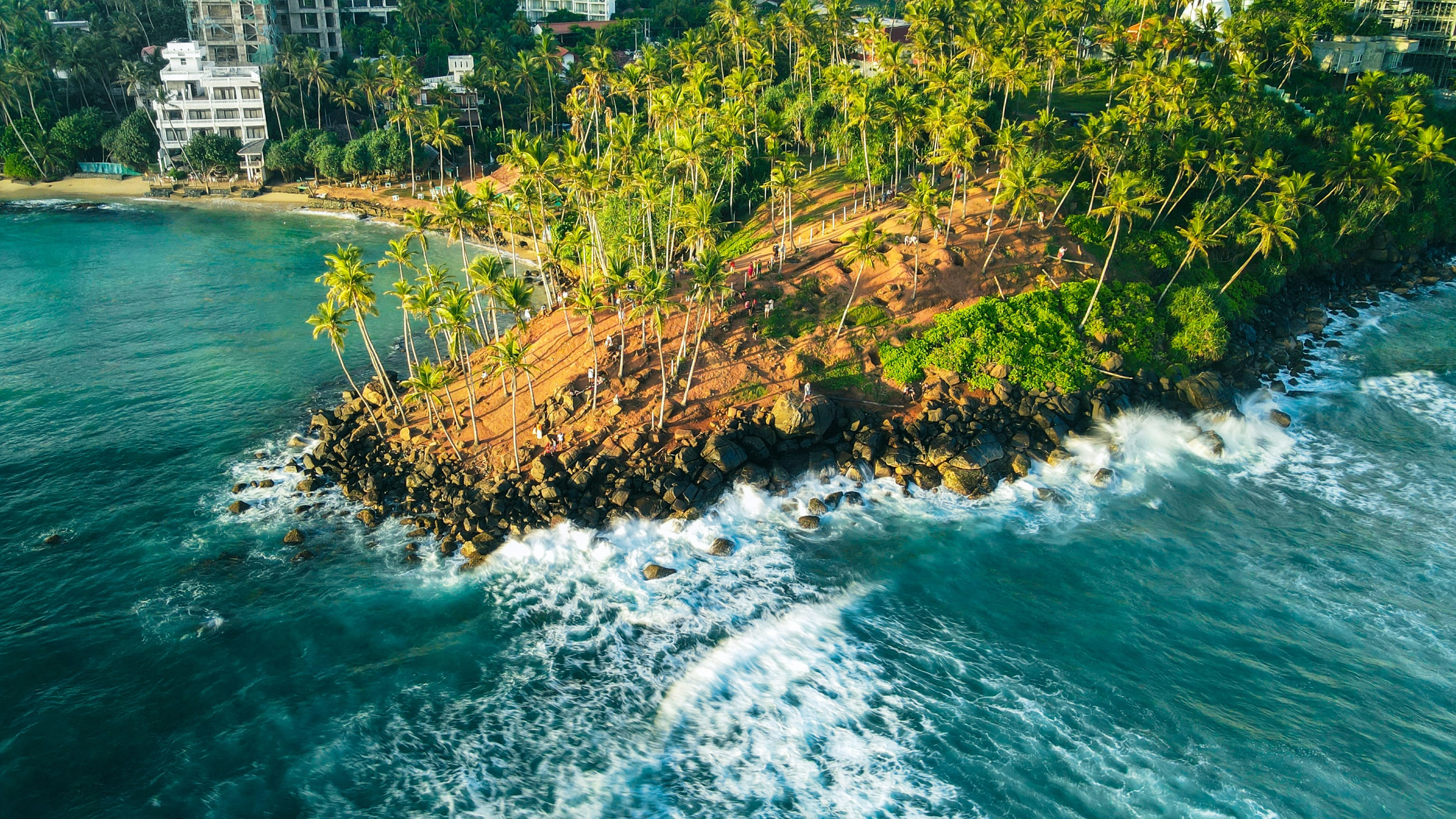
Explore Mirissa - Sri Lanka Travel, Asia
Mirissa is a charming coastal town on Sri Lanka’s southern shoreline. Known for its golden beaches, turquoise waters, and vibrant marine life, it has become a must-visit stop for travelers exploring the island. Many come for whale watching, surfing, and sunset views at Coconut Tree Hill, but Mirissa offers much more than postcard beauty. The fishing boats you see anchored by the bay carry generations of stories. Local traditions, delicious cuisine, and a laid-back rhythm of life shape every visitor’s experience.
Population: Approximately 4,700 in 2023.
Economy: Mirissa’s economy is largely shaped by its coastal location. Fishing has long been the backbone of local livelihoods, with generations relying on the Indian Ocean for income. In recent decades, tourism has become the main driver of growth, thanks to whale watching, surfing, and beachside hospitality.
Landmarks: Famous for Mirissa Beach, Coconut Tree Hill, and Parrot Rock Bridge.
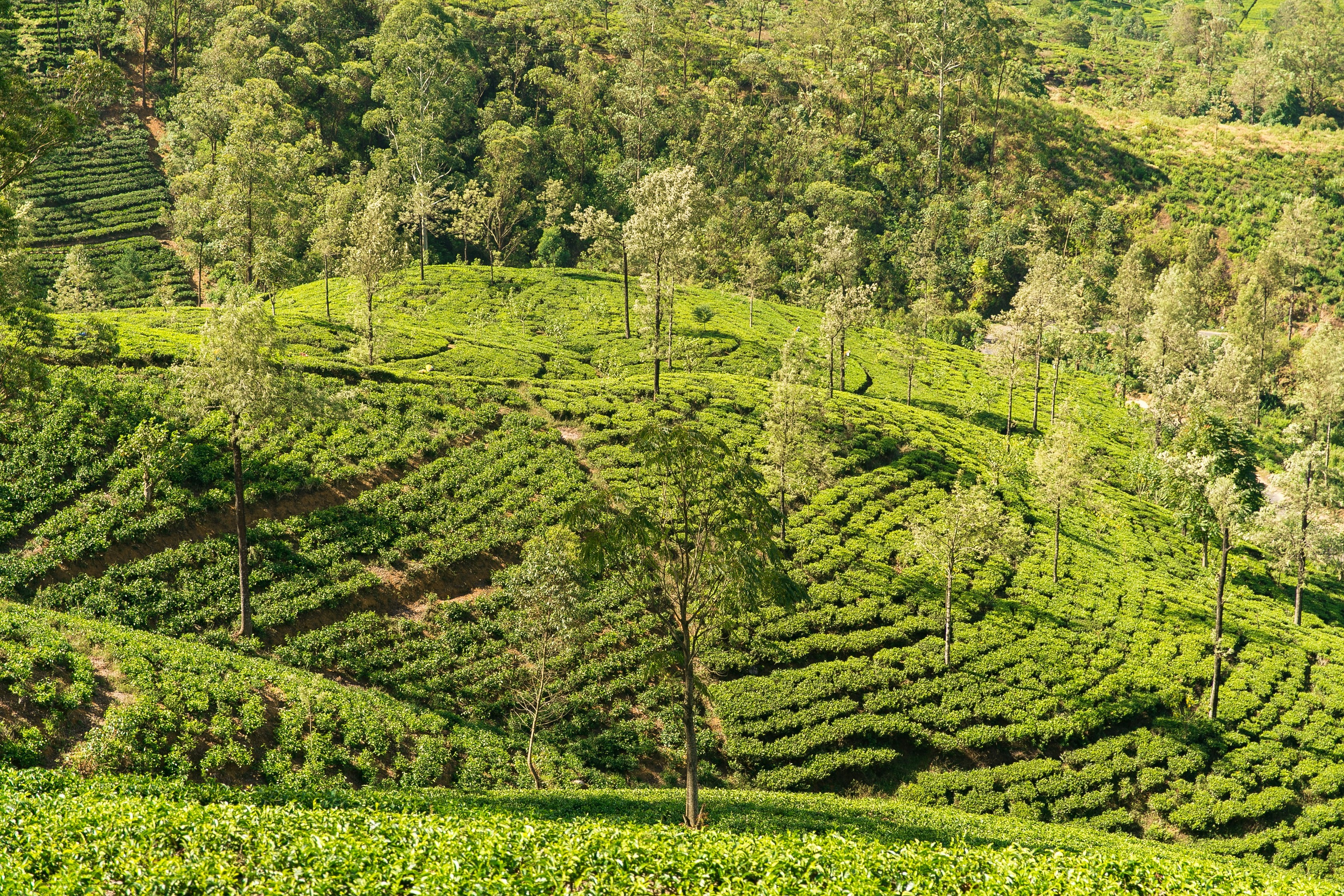
Explore Nuwara Eliya - Sri Lanka Travel, Asia
Tucked away in the Central Highlands of Sri Lanka, Nuwara Eliya is often called “Little England”. With its rolling tea plantations, cool misty mornings, and colonial charm, this mountain town feels like a step into another world. Travelers come here to breathe fresh air, walk through flower gardens, sip the finest Ceylon Tea, and enjoy a pace of life far from the island’s busy cities. Whether you’re drawn by scenic landscapes, heritage architecture, or the warmth of its people, Nuwara Eliya is a destination that blends nature, culture, and history in perfect harmony.
Population: Approximately 781,000 in 2023.
Economy: Nuwara Eliya’s economy thrives mainly on tea production, as it sits in the heart of Sri Lanka’s central highlands, famous worldwide for Ceylon Tea. The city also benefits from a growing tourism industry, attracting visitors with its colonial charm, cool climate, and scenic landscapes.
Landmarks: Famous for Gregory Lake, Hakgala Botanical Garden, and Victoria Park.
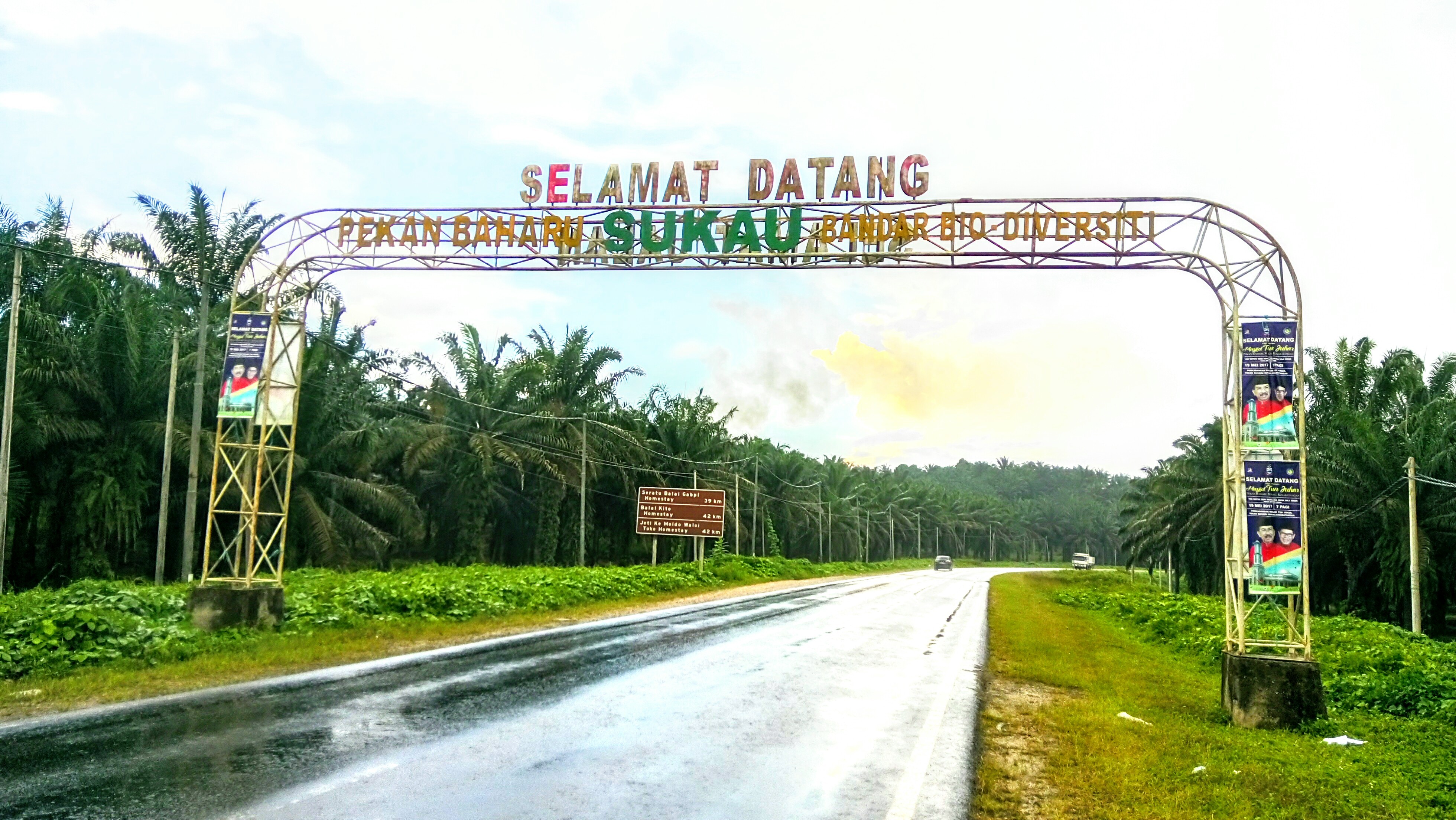
Explore Sukau - Malaysia Travel, Asia
Nestled on the banks of the Kinabatangan River in Sabah, Malaysian Borneo, Sukau is a destination where wildlife, culture, and conservation come together. Known as one of Asia’s top spots for river safaris and eco-tourism, this quiet village offers a front-row seat to encounters with Bornean orangutans, pygmy elephants, proboscis monkeys, and exotic birdlife.
Population: Approximately 1,400 in 2019.
Economy: Sukau’s economy is shaped by its riverine location and natural resources. Traditionally, the Orang Sungai community relied on fishing, small-scale farming, and forest gathering for their livelihood. Today, the village has shifted toward eco-tourism, with river cruises, jungle trekking, and homestays providing income.
Landmarks: Famous for the Kinabatangan River cruises, Gomantong Caves, and Ox-bow lakes and wetlands.
